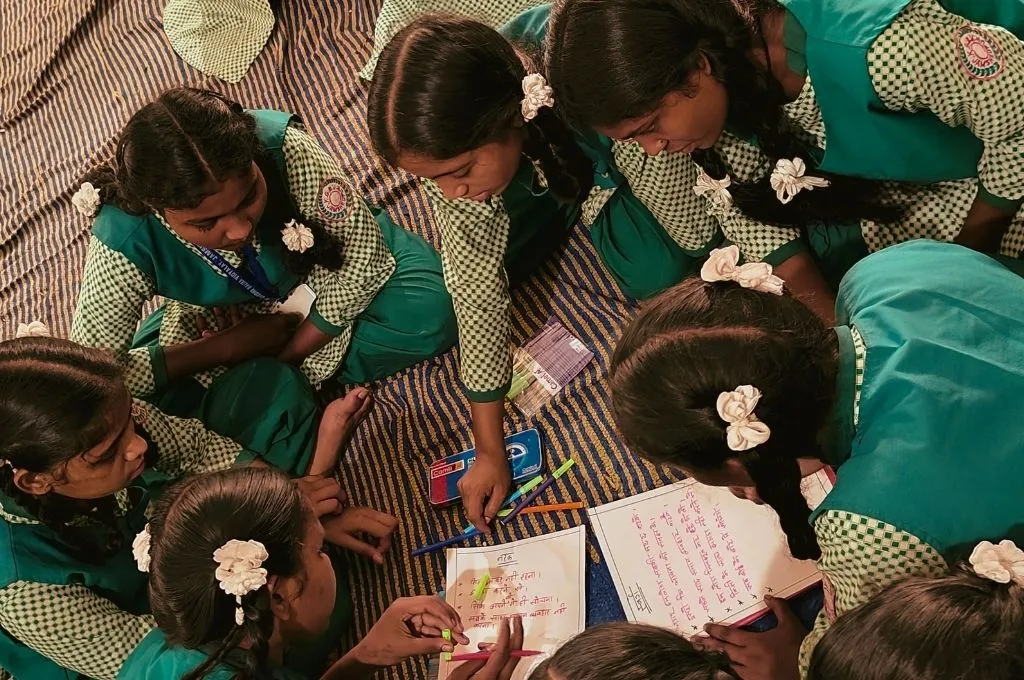ઝારખંડમાં એક વાર્તાએ મેલી વિદ્યાની પ્રથાને કેવી રીતે પડકારી

હું ઝારખંડના પૂર્વ સિંગભૂમ જિલ્લામાં ક્વેસ્ટ એલાયન્સમાં પ્રોગ્રામ ઓફિસર તરીકે કામ કરું છું. મારું કામ શિક્ષકોને સોશિયલ-ઈમોશનલ લર્નિગ (એસઈએલ સામાજિક-ભાવનાત્મક શિક્ષણ) માં મદદ કરવાનું છે, આ એક એવી શિક્ષણ પદ્ધતિ છે જે ઊંડાણપૂર્વક સાંભળવાને અને ટીકા થશે એવો ડર રાખ્યા વિના પોતાના અંગત અનુભવો અને લાગણીઓ વ્યક્ત કરવાને પ્રાથમિકતા આપે છે. હું કાર્યક્રમનો ભાગ હોય તેવી રમતો અને વાર્તા-કથન સત્રોનું ધ્યાન રાખું છું અને તેમાં ભાગ લઉં છું.
2023 માં હું મારા જિલ્લાના કસ્તુરબા ગાંધી બાલિકા વિદ્યાલયમાં ધોરણ 9 ના વિદ્યાર્થીઓ માટે એક વર્ગ લઈ રહી હતી. અમે સુમેરા ઉરાંઓ (એક તખલ્લુસ) વિશે ચર્ચા કરી રહ્યા હતા, તેમની વાર્તા અમે જે અભ્યાસક્રમ શીખવતા હતા તેનો ભાગ હતી. ગ્રામીણ ઝારખંડની ઘણી મહિલાઓની જેમ સુમેરા પણ મેલી-વિદ્યાનો શિકાર બનવામાંથી બચી ગયા હતા; તેમણે પોતાનું જીવન ડાકણનો થપ્પો લાગવાને કારણે સહેવા પડતા કલંક સામે લડવામાં અને તેની સાથે સંકળાયેલી અંધશ્રદ્ધાઓનો સામનો કરવામાં વિતાવ્યું હતું.
તે એસઈએલ વર્ગ હોવાથી વિદ્યાર્થીઓને તેમની લાગણીઓ સમજવામાં અને બીજા લોકો પ્રત્યે સહાનુભૂતિ કેળવવામાં મદદ કરવા પર ધ્યાન કેન્દ્રિત કરવામાં આવ્યું હતું. વાર્તા-કથન પછી એક પરંપરાગત ચિંતન સત્ર યોજાયું હતું, જેમાં વિદ્યાર્થીઓએ વાર્તા વિશેની તેમની સમજણ અને તે તેમના જીવન પર કેવી અસર કરે છે તે રજૂ કર્યું હતું. મેં જોયું કે એક છોકરી સમગ્ર વાતચીતનું ધ્યાનપૂર્વક નિરીક્ષણ કરી રહી હતી. સત્ર પૂરું થયા પછી મારી પાસે આવીને તેણે પૂછ્યું, “તમે કહ્યું હતું કે આ એક સાચી વાર્તા છે. શું તમે મને સુમેરાનો ફોન નંબર આપી શકો?”
મેં તેને પૂછ્યું, “તારે તેનો નંબર શા માટે જોઈએ છે?” જવાબમાં બાળકીએ મને તેની દાદી વિશે વાત કરી જેમને તેમના ગામમાં ડાકણ કહેવામાં આવતા હતા અને લોકો દ્વારા તેમને સમાજમાંથી બહિષ્કૃત કરવામાં આવ્યા હતા.
તેણે કહ્યું, “અમારા ગામમાં કોઈ મારી દાદીની નજીક આવતું નથી કે તેમની સાથે વાત કરતું નથી. તેઓ કહે છે કે તે બાળકો પર ખરાબ નજર નાખે છે. તેમને ગામની દુકાનોમાંથી વસ્તુઓ ખરીદવાની પણ મંજૂરી નથી.”
મેં સુમેરાની વાર્તામાંથી તેને શું શીખવા મળ્યું તે વાત ઘેર જઈને તેના પરિવારને જણાવવા કહ્યું. પરિવારના સભ્યોને સંદેશો પહોંચાડતા પહેલા તેણે પોતે શું થઈ રહ્યું છે તે અને સત્ય શું છે તે સમજવું જરૂરી હતું, તે પોતે એ સમજે તો જ તે પોતાના પરિવારને સમજાવી શકે કે હકીકતમાં ડાકણો જેવું કંઈ હોતું નથી અને તે માત્ર અંધશ્રદ્ધાની પેદાશ છે.
તેના દાદી ખૂબ સહન કરી ચૂક્યાં હતાં અને ગામ છોડવા તૈયાર થઈ ગયાં હતાં કારણ કે આખો સમુદાય તેમની વિરુદ્ધ હતો. પરંતુ આ બાળકીએ પોતાના પરિવારને આ મામલો પંચાયતમાં લઈ જવા માટે સમજાવ્યો કારણ કે તેને શાળામાં કહેવામાં આવ્યું હતું કે કોઈ વ્યક્તિને ડાકણ કહેવું અને તેમની સાથે ભેદભાવ કરવો એ સજાપાત્ર ગુનો છે. પંચાયતની બેઠકમાં પરિવારના સભ્યોએ તર્ક રજૂ કર્યો, “અમારા પરિવારમાં આટલા બધા બાળકો છે, અને તે બધાં સ્વસ્થ છે. જો તેમની (દાદીની) હાજરીથી બાળકો પર અસર થતી હોત, તો શું અમારા પરિવારના બાળકો પણ પીડાતા ન હોત?” પંચાયતે પરિવારની તરફેણમાં ચુકાદો આપ્યો અને ગામલોકોએ નમવું પડ્યું. તે વાતચીતને એક વર્ષથી વધુ સમય થઈ ગયો છે અને પરિવાર હજી પણ તે ગામમાં રહે છે.
પછીથી મેં તે બાળકીને કહ્યું કે આ વાર્તામાંથી શીખેલા પાઠને તેના જીવનમાં લાગુ કરવાની તેની ક્ષમતાને કારણે જ આ શક્ય બન્યું છે. તેણે જવાબ આપતા કહ્યું, “જ્યારે હું વાર્તા પરથી મારા મનમાં ઉઠતા વિચારો લખું છું ત્યારે હું વધુ આત્મવિશ્વાસ અનુભવું છું અને મારા મંતવ્યો વ્યક્ત કરતા મને ઓછો ડર લાગે છે.”
પ્રીતિ મિશ્રા ક્વેસ્ટ એલાયન્સમાં પ્રોગ્રામ ઓફિસર છે.
ટ્રાન્સલેશન ટૂલનો ઉપયોગ કરીને અંગ્રેજીમાંથી અનુવાદિત કરવામાં આવેલ આ લેખની સમીક્ષા અને તેનું સંપાદન મૈત્રેયી યાજ્ઞિક/આકાશ પરમાર દ્વારા કરવામાં આવેલ છે.
—
વધુ જાણો: ભારતમાં સામાજિક-ભાવનાત્મક શિક્ષણ આંતરછેદવાળું શા માટે હોવું જોઈએ તે જાણો .
વધુ કરો: લેખકના કાર્ય વિશે વધુ જાણવા અને તેમના કાર્યને તમારું સમર્થન આપવા priti@questalliance.net પર તેમનો સંપર્ક સાધો.



